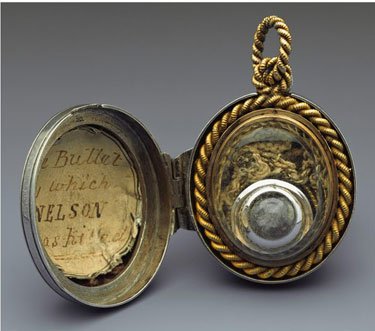
This is the bullet which killed Admiral Horatio Nelson at the Battle of Trafalgar in 1805.
At four o’clock in the morning of 21 October Nelson ordered the Victory to turn towards the approaching enemy fleet, and signalled the rest of his force to battle stations. He then went below and made his will, before returning to the quarterdeck to carry out an inspection. Despite having 27 ships to Villeneuve’s 33, Nelson was confident of success, declaring that he would not be satisfied with taking fewer than 20 prizes. He returned briefly to his cabin to write a final prayer, after which he joined Victory’s signal lieutenant, John Pasco.
Mr Pasco, I wish to say to the fleet “England confides that every man will do his duty”. You must be quick, for I have one more signal to make, which is for close action.
Pasco suggested changing ‘confides’ to ‘expects’, which being in the Signal Book, could be signalled by the use of a single flag, whereas ‘confides’ would have to spelt out letter by letter. Nelson agreed, and the signal was hoisted.
As the fleets converged, the Victory’s captain, Thomas Hardy suggested that Nelson remove the decorations on his coat, so that he would not be so easily identified by enemy sharpshooters. Nelson replied that it was too late ‘to be shifting a coat’, adding that they were ‘military orders and he did not fear to show them to the enemy’. Captain Henry Blackwood, of the frigate HMS Euryalus, suggested Nelson come aboard his ship to better observe the battle. Nelson refused, and also turned down Hardy’s suggestion to let Eliab Harvey’s HMS Temeraire come ahead of the Victory and lead the line into battle.
Victory came under fire, initially passing wide, but then with greater accuracy as the distances decreased. A cannonball struck and killed Nelson’s secretary, John Scott, nearly cutting him in two. Hardy’s clerk took over, but he too was almost immediately killed. Victory’s wheel was shot away, and another cannonball cut down eight marines. Hardy, standing next to Nelson on the quarterdeck, had his shoe buckle dented by a splinter. Nelson observed ‘this is too warm work to last long’. The Victory had by now reached the enemy line, and Hardy asked Nelson which ship to engage first. Nelson told him to take his pick, and Hardy moved Victory across the stern of the 80-gun French flagship Bucentaure. Victory then came under fire from the 74-gun Redoutable, lying off the Bucentaure’s stern, and the 130-gun SantÃsima Trinidad. As sharpshooters from the enemy ships fired onto Victory’s deck from their rigging, Nelson and Hardy continued to walk about, directing and giving orders.
Shortly after one o’clock, Hardy realised that Nelson was not by his side. He turned to see Nelson kneeling on the deck, supporting himself with his hand, before falling onto his side. Hardy rushed to him, at which point Nelson smiled
Hardy, I do believe they have done it at last… my backbone is shot through.
He had been hit by a marksman from the Redoutable, firing at a range of 50 feet (15 m). The bullet had entered his left shoulder, passed through his spine at the sixth and seventh thoracic vertebrae, and lodged two inches (5 cm) below his right shoulder blade in the muscles of his back.
Nelson was carried below by sergeant-major of marines Robert Adair and two seamen. As he was being carried down, he asked them to pause while he gave some advice to a midshipman on the handling of the tiller. He then draped a handkerchief over his face to avoid causing alarm amongst the crew. He was taken to the surgeon William Beatty, telling him
You can do nothing for me. I have but a short time to live. My back is shot through.
Nelson was made comfortable, fanned and brought lemonade and watered wine to drink after he complained of feeling hot and thirsty. He asked several times to see Hardy, who was on deck supervising the battle, and asked Beatty to remember him to Emma, his daughter and his friends.
Hardy came belowdecks to see Nelson just after half-past two, and informed him that a number of enemy ships had surrendered. Nelson told him that he was sure to die, and begged him to pass his possessions to Emma. With Nelson at this point were the chaplain Alexander Scott, the purser Walter Burke, Nelson’s steward, Chevalier, and Beatty. Nelson, fearing that a gale was blowing up, instructed Hardy to be sure to anchor. After reminding him to “take care of poor Lady Hamilton”, Nelson said “Kiss me, Hardy”. Beatty recorded that Hardy knelt and kissed Nelson on the cheek. He then stood for a minute or two before kissing him on the forehead. Nelson asked, “Who is that?”, and on hearing that it was Hardy, he replied “God bless you, Hardy.” By now very weak, Nelson continued to murmur instructions to Burke and Scott, “fan, fan … rub, rub … drink, drink.” Beatty heard Nelson murmur, “Thank God I have done my duty”, and when he returned, Nelson’s voice had faded and his pulse was very weak. He looked up as Beatty took his pulse, then closed his eyes. Scott, who remained by Nelson as he died, recorded his last words as “God and my country”. Nelson died at half-past four, three hours after he had been shot.

Coloured engraving by J. Heath after Benjamin West, The death of Lord Nelson aboard HMS Victory at the battle of Trafalgar, 1811.
Hat tip to Ratak Monodosico.





Please Leave a Comment!